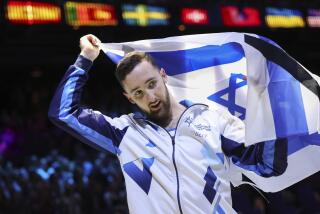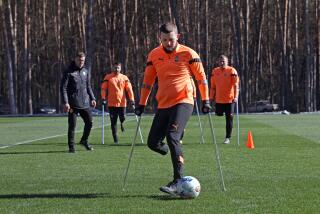Triumph for Youth of Intifada
- Share via
GAZA CITY — Waving Palestinian flags and chanting of the greatness of God, thousands of Palestinians lined the streets here one recent night, gathered for hour upon hour of jubilant celebration.
The occasion was not the arrival of their president, Yasser Arafat. Nor was it the freeing of political prisoners, nor the transfer of more land from the Israelis.
The object of such spontaneous joy was the homecoming of a victorious Palestine National Soccer team.
To the amazement of just about everybody in the Arab world, the ragtag team made not just a respectable showing in international play, but brought home the bronze from a pan-Arab tournament in which the team’s participation was so questionable that it missed its opening match.
And so Palestinians, tired of a peace process that appears to go nowhere and alienated from a political system that seems irrelevant, suddenly have a new and unexpected hero. As the Palestinian pseudo-state gains the trappings of sovereignty--an airport, a passport, an anthem--Palestinians can now add a victorious national sports team.
“Stars!” proclaimed the Palestinian newspapers in the wake of the recent success. “Crowned atop the throne of the Middle East!”
Let’s not exaggerate. The Palestine National Soccer team ranks 169 in the 202-nation men’s international standings. (Israel is at 24, the U.S. at 20.) Some might argue that its success has been more fluke than flair. Still, those in search of emotional confirmation of a fledgling national identity need look no further.
The Cinderella team, faced with a crowded field of obstacles, became “a major morale booster and national unifier,” said Palestinian commentator Daoud Kuttab. “What the team lacked in skills they made up in unbelievable tenacity and effort.”
Soccer in the Arab world often becomes a means to express anger, frustration or other feelings that cannot be expressed at home, says Eyad Surraj, a Gaza Strip psychiatrist and prominent political activist. Soccer can be a rebellion against an unpopular regime or a challenge to an occupying force, he said.
Among Palestinians, the emergence of the national team has become an important outlet for a socially and politically disengaged people.
“The younger generation identifies with something totally different from what we did in our time,” Surraj said. “This is a way for them to express their identity and their energy. It is a healthy thing, although it does not take away all the pressure faced by youth. You can’t have football games every day, all the time.”
Most of the players cut their teeth on the intifada. They were the youths who clashed in the streets with Israeli troops in the late 1980s and early ‘90s, hurling stones and receiving tear gas in exchange. They are sons of refugees who were forced from their land and homes by the birth of the Israeli state.
But they are also part of a new class of Palestinians who are looking past war and toward a different, more practical future.
Star Player Clashed With Israelis as Child
Star striker Ziad Kurd grew up in a refugee camp after the Israeli army demolished his home and arrested his father for planting terrorist bombs that injured about a dozen Jews. The younger Kurd, when he wasn’t playing soccer as a kid, threw rocks at Israeli soldiers.
Today, in between receiving congratulations from Arafat and appearing at Palestinian ceremonies honoring the team, he chats amiably on his cellular telephone with Israeli sports reporters and has been featured on Israeli television.
Kurd was as stunned as anybody at the achievements of his team in the Arab Games in Amman, Jordan, last month, where the Palestinians weren’t expected to make the quarterfinals, and more stunned at the reception given the players upon their return.
“When I saw that crowd, I felt like we had a bigger mission,” Kurd said in an interview in the dirt garden of his half-built Gazan home. “Before, I thought we were just playing football. Now we are full of responsibility. People are looking to us for hope.”
A soft-spoken 25-year-old, Kurd has fair, close-cropped hair and the chiseled forearms and calves typical of an athlete in his prime. His wife is pregnant, and they already have one child, a green-eyed 16-month-old daughter, Ragda, who sits on his lap and giggles and pouts in imitation of the female adults around her.
“This means I’m something now,” Kurd said. “I look at everything the Israelis are doing, and I look at us, and I feel like at least we could achieve something.”
Kurd played in the tournament with the added anxiety of wondering whether his father would be freed from prison. As part of revived peace negotiations, the Israeli government and the Palestinian Authority agreed to the release of 750 Palestinians from Israeli jails, and the first batch was to go home Sept. 9.
In the end, Kurd’s father, Ibrahim, was among those freed. The Kurd family celebrations of Ziad’s sports fortune were easily transformed into a party for the returning patriarch.
After 11 years in an Israeli prison, the 51-year-old former math teacher doesn’t regret his actions, operations in which he detonated bombs in an Israeli school, on an Israeli bus and at other targets.
It was war, he says. The struggle today, he says, has shifted to “the political phase.”
While in prison, Ibrahim faithfully clipped the Israeli newspaper accounts of his son’s games. He watched the Jordan championship on television in prison, his shouts of joy attracting the suspicion and irritation of the Israeli guards until they realized what was going on.
“I was playing to make my dad happy,” Ziad Kurd said.
Glory for the Palestinians came in the form of a third-place, medal-winning finish. Other than the opening-game forfeit, their team lost just once, to Jordan, the champion, and beat or tied other relative powerhouses such as Libya and the United Arab Emirates.
Yet the 22-man Palestinian squad only barely came together.
To build and train the team, coaches and players had to contend with the same vagaries that ordinary Palestinians confront on a daily basis, from Israeli military checkpoints and border closures to the political demands of Palestinian Authority officials.
Some players live in the West Bank, the rest in Gaza; because most Palestinians aren’t allowed to move between the two enclaves, the full contingent never played together until two weeks before the tournament.
Carrying a special permit, Coach Azmi Nasar spent hours on the road every day, crisscrossing Israel to travel back and forth between the two halves of the team.
Nasar also had to fight meddling by the Palestinian Authority, until he was given a free hand to manage the team. Palestinian officials squabbled among themselves over which faction would control national sports matters; Nasar didn’t get the green light to work until a few months before the Jordan tournament was to begin.
Then he had to get more special permits from Israeli authorities so that the players, eventually, could travel to Egypt to practice together. Israeli customs officials held up arrival of the uniforms. Lack of money held up departure from Egypt to Jordan. (The team arrived too late to play its opening match.)
In all, members of the squad trained, separately and then together, for six weeks, Nasar said.
“It is not enough time,” said Nasar, 42, an Arab who lives in the Israeli city of Nazareth. “They needed years to make a good team. But the boys worked very hard, and they very much wanted to be a good team. Maybe God took care for us.”
Role Models for a Future Generation
Nasar and Kurd said a mere $30,000 was invested in the Palestinian team--contrasted with the millions spent by Persian Gulf states and other Arab competitors. While other Arab teams jetted around the world for specialized training on European fields, Nasar said, the Palestinians were bunking “like poor people” in a cramped Gaza stadium that lacked air-conditioning and carpooling overland hundreds of miles to Egypt.
And then there were the knock-down, drag-out fights that erupted during the tournament. According to the Palestinians, they were attacked by players from Libya and Syria, both of whose hard-line regimes are highly critical of the Palestinian decision to make peace with Israel. The locker-room brawls spilled onto the fields, and several players ended up in the hospital.
By forcing both Libya and Syria to ties, the Palestinians helped ensure the elimination of both powerful teams from the tournament--an especially sweet feat.
“They didn’t play great,” Nasar said of his team. “They played normal, but with very big spirit, and heart, and for the Palestinian people. . . . We were a very big surprise for all Arab football. Palestinians lose all the time and don’t have any money. Everyone thought we would be nothing.”
Arafat, the aging, venerated president of the Palestinian Authority, telephoned the team “maybe 100 times” during the tournament, with excited words of encouragement. As reward for their play, all of the squad members were given the rank of officers in Palestinian security services--and the steady salary that goes with it.
On the streets of Gaza, people are now looking forward to the Palestine National Soccer team’s next big outing, in Asian games in the spring.
At Gaza City’s Palestine Stadium recently, the future generation was at play. Young boys scuffling in the dirt were kicking a ball against the stadium’s outer wall.
Asked about the national team, they eagerly sounded off the names of their favorite players and recalled with wide-eyed relish their best moves of the tournament.
What did these young boys want to be when they grew up? Not politicians, not soldiers. Soccer players, each boy said. “Inshallah.” God willing.
More to Read
Go beyond the scoreboard
Get the latest on L.A.'s teams in the daily Sports Report newsletter.
You may occasionally receive promotional content from the Los Angeles Times.








